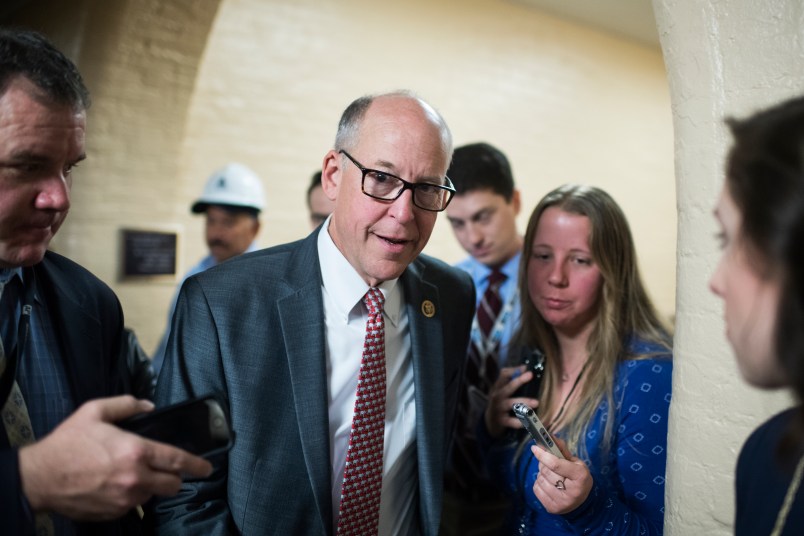Opposition to the the GOP bill to repeal the Affordable Care Act continued to emerge on Wednesday—the bill’s second day in the public eye—with statements condemning the bill from groups representing doctors, nurses, hospitals, and the elderly.
Mobbed by reporters as he emerged from casting an afternoon vote, the bill’s author Rep. Greg Walden (R-OR) brushed off the latest round of criticism, saying the thousands of hospitals and hundreds of thousands of doctors are part of a “medical industrial complex” that opposes major reforms to Medicaid.
“The hospitals came out against Medicaid reform before they ever saw the bill,” said Walden, who chairs the House Energy and Commerce Committee. “But, you know, we understand that there’s a pretty big medical industrial complex that when you touch it, it touches back.”
Walden said he found the hospital organizations’ staunch opposition to his bill “sort of shocking,” because it includes a provision the hospitals very much want: a restoration of the Disproportionate Share Hospital (DSH) funding that was scaled back under the Affordable Care Act.
Before Obamacare’s implementation, hospitals that treated indigent people who couldn’t pay their bills received federal funding to cover some of those costs. When Obamacare allowed many of those same people to become covered under Medicaid, those payments were rescinded. Walden told reporters his bill—which freezes the Medicaid expansion in 2020 and turns it into block grants that lose value over time—would restore the previous model.
“We repealed the DSH cuts in states that didn’t do the [Medicaid] expansion. In the first two years, they go away,” he said. “In the states that did [expand Medicaid], they go away thereafter. That was one of their big asks, so this [criticism] is sort of disappointing.”
Walden’s lament that hospitals are not satisfied with getting one of their “big asks” in the bill contrasts sharply with the rhetoric of White House press secretary Sean Spicer, who railed Wednesday against catering legislative provisions to particular interest groups.
“This isn’t about trying to figure out how many special interests in Washington we can get paid off,” he said.
When Obamacare was passed, he added, Democrats used “one deal after another” to “buy votes.”
The associations opposing the bill—who collectively represent thousands of religious, private, and public hospitals across the country—warn that Walden’s bill will create “tremendous instability” in the health care sector and “is likely to result in a substantial reduction in the number of Americans able to
buy affordable health insurance or maintain coverage.”







The lessons that stay with you the longest are the ones learned through painful experience. America is about to get quite the education.
Prematurely bald right winger meant to say “military Industrial complex”, but with trumpism running amok, we’ll see cuts to TSA, Coast Guard, FEMA, et al in order to build the wall.
What a fucking moron.
The re-institution of DSH would in no way remotely make up for the billions the Hospitals would lose by suddenly having to absorb the cost of millions of poor, sick, UNINSURED people resorting to the UNCOMPENSATED use of their Emergency Rooms for basic care again like pre-ACA.
The Hospitals took one look at that part of the bill and said: “Fuck that Shit!”
Wait till all those smaller “community hospitals” serving Bugtussel and Butt Plug go belly up and all of Trump’s supporters discover that the better cheaper health care coverage Trump promised them isn’t, and that the fallback solution of taking your fanny to an ER when the pain gets too strong to endure requires a 200 mile drive to get help, and all of the other residents of Bugtussel and Butt Plug suddenly see THEIR hospital charges from that hospital 200 miles away go up by another 35-40% to cover the ER charges their neighbors couldn’t pay…just like the good old days…BEFORE Obamacare.
One of those cases where the best education on a complex subject like health insurance is when you actually try to get it, use it or pay for it, and discover you are royally screwed. Afraid it may have to happen before the citizens of Bugtussel and Butt Plug, armed with pitchforks, start heading for Paul Ryan’s house.